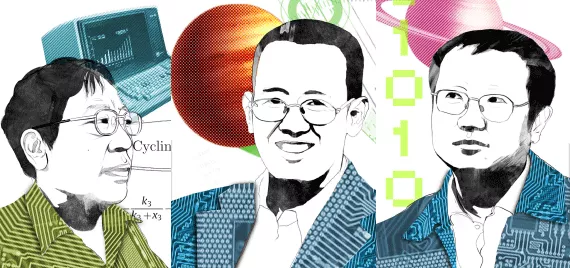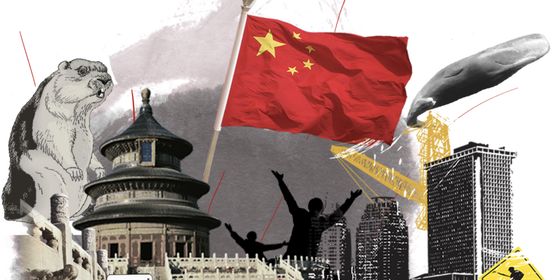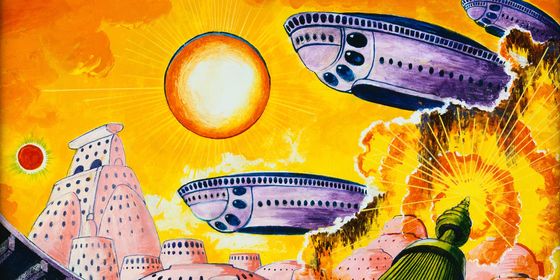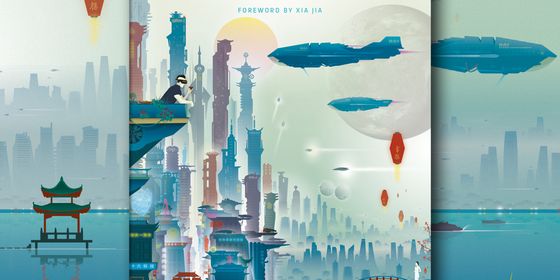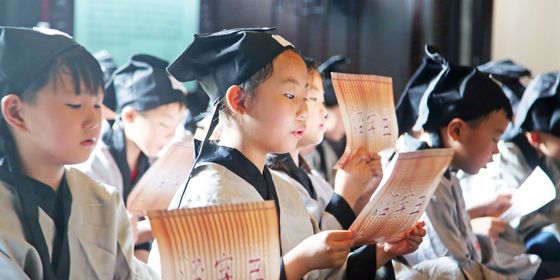Did you know? They talk to the future.
Few know their real identities. The most fan recognition they get is “You have the same name as a famous sci-fi author!” By day, they study engineering, write computer programs and edit international news. By night, they enter secret imaginary worlds. Writing in content solitude, they talk to the future. Year after year, their names grace the pages of the very best Chinese science fiction: Wang Jinkang, Liu Cixin and Han Song.
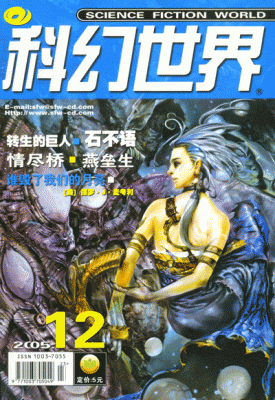
The Reincarnated Giant, by Wang Jinkang
Wang Jinkang (王晋康): A Fortification Constructer in Awe of Nature
“In 2253, an astronaut returns to Earth. He has spent 202 years exploring an extraterrestrial civilization ten light years away. As the only survivor of the expedition, he is awarded the title ‘Hero of Humans.’ Yet, he discovers that it is not real human beings celebrating his return. Though their appearance remains the same, these humans’ brains are installed with advanced artificial intelligence software. They have all become robots…”
Once a chassis engineer for oil rigs, the now retired Wang Jinkang made this story up for his ten-year-old son in 1992. It was a day like any other. From the quiet city of Nanyang in Henan Province, where Wang works and lives, he could not have envisioned the wild success this children’s story would bring.
As always, when Wang finished telling the story he asked his son what he thought. Many a time, the boy had said, “Today’s story is bad.” And Wang accepted the honest critique. But that day, Wang’s son earnestly replied, “You told a good story today. Did you make it up yourself or read it somewhere?”
Encouraged by his son’s remarks, Wang sat down to write out the whole short story in just two days. He knew nothing about sci-fi magazines and only happened upon copies of Science Fiction World at a street vendor by chance. Without much thought, he mailed his first sci-fi story to the editors.
Nineteen years have passed and Wang still gets excited when he recalls the editors’ reply, “This story took our breath away.”
Wang is not good at concealing his emotions, especially when he feels pride. “I wrote two more sci-fi short stories in three days, as they requested. The stories had been sitting in my mind for a long time. They published both! So I started to write more.”
The next ten years of Chinese sci-fi literary history were thus branded with Wang’s name.
In total he published 50 short stories and 10 novels. The 1990s were an exciting time for sci-fi fans. Youngsters even chose Xi’an Jiaotong University to study engineering. They were emulating their sci-fi hero who studied there. Some even chose majors inspired by his novels, including traditional medicine and biology.
For them, Wang had opened a new world. In the worlds he created, an intricate scientific system and profound natural order shined with the infinite light of beauty. “I love science and nature,” he says with a pious expression. “I want to arouse people’s curiosity in these subjects and help them think rationally.”
Wang is disciplined when it comes to the precision of scientific theory in his writing. He doesn’t describe an imagined technology unless there is logic behind it. “If a technological theory can’t be proven, it should be disproven,” he says with confidence. The worlds he creates also show the infinite possibilities of the universe. As Wang puts it, “Sci-fi is not about predicting the future but about opening our minds. It enables us to think of ways to advance civilization.”
Last year’s hit movie “Inception” brought Wang’s fans back to his short story “Seven Layers of a Shell.” Written ten years ago, the story revolves around a hero who nearly finds himself trapped in layer upon layer of virtual reality.
Computer induced traps may be set in the future. Wang says, “Science has shown that human intelligence is just a result of complicated combinations of matter. Someday, computers will surpass human intelligence. Machines already exceed human brains in many ways. They process at lightning speed and store infinite amounts of information.” In his 1999 novel “Beekeeper,” Wang envisions an even sadder possibility: “My children, have you ever considered that the human brain, 1400 grams heavy, may also have its limitations; that human intelligence might someday plateau?”
Wang’s kind nature won’t allow him to stop with this sort of grim finality. He always creates solutions for his futures. In the novel “Humanoid,” he sets a rule for the cloning of humans: clones are produced without the miniscule ridges on the fingers tips that make fingerprints. This is how clones are differentiated from humans. In another example, his professor character in “The Song of Life” installs a self-destruction setting in the hearts of robots: should they develop a lust for life, they will explode.
“I am powerless if disaster strikes. I am just trying to build fortifications to protect humanity,” an old scientist says in Wang’s first story. This heroic morality pervades all of Wang’s works.
These days, caring for his grandson is Wang’s responsibility, as is the case for most Chinese people after retirement. When time allows, he likes to write for six hours a day. He is sorry he doesn’t have more time to write. His biggest wish, written in the prologue of “Humanoid,” is that even if his sci-fi solutions won’t come to be, perhaps they might make people “glance a little bit further into the future.”
Liu Cixin (刘慈欣): King of Imagination
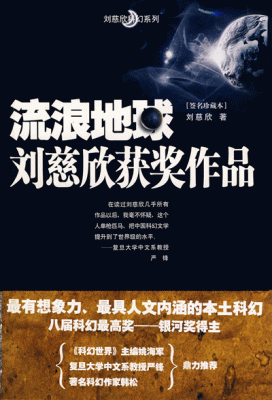
Wandering Earth, by Liu Cixin
Last year, Wang Jinkang gave a lecture at Xi’an Jiaotong University. He spoke hopefully: “If only one Chinese sci-fi author writes a hit, the genre will have a bright future.”
The approximately 500,000 copies of Liu Cixin’s “Three Body Trilogy” that have been sold indicate that this writer has the potential to become the star sci-fi writer that Wang hoped for. Liu’s fans call themselves “magnets” to describe their attraction to him and because his name rhymes with the Chinese for magnet, citie. At an event for “Three Body Trilogy III,” which came out last year, people queued for two hours in the cold of winter to get his autograph.
In event photos, Liu smiles mildly. He looks sweet and patient. But rumors spread among the journalists who have interviewed this increasingly popular figure. Some claim jokingly that he is an “interviewer’s nightmare.” His responses are always terse.
Once he was asked, “How do you refresh yourself when you’re writing? Coffee or tea?” His answer, “I don’t refresh myself. I go to sleep when I am sleepy.” When asked, “What do you read?” his reply came, “Just the books that people generally read.”
If you haven’t read his books, it’s hard to see the sincerity in his answers. They are just unconscious down-to-earth reflections. No beating around the bush. “Let’s just talk about sci-fi,” is the first sentence he utters when I ask about his personal life. Liu is constantly immersed in complex science fiction worlds. He always says his real life is rather simple and direct by comparison. When sci-fi comes up he is very talkative.
Liu’s works are famous for their imaginative splendor and lush descriptions. The joy in reading his books is like the “experience of ecstasy,” which he describes in his short story “Micro Era”:
“He imagines the ecstasy the ‘Micros’ (tiny people) feel when they first see green grass as tall as the sky. And what about a small plot of grass? What does that mean to the micro people? A grassland! Then what does a grassland mean? A green universe! And the stream weaving through the grassland? Watching the flowing water from behind the protection of a grass root, the ‘Micros’ are ecstatic indeed!”
The wondrous amazement the Micros must experience is akin to what readers feel when they read Liu’s words. His portrayals are just so vivid. He writes with this mantra: “I want to bring people into my imaginary world, and uncover the hidden mysteries in the universe.”
Liu is more curious than an ordinary person. He puts tremendous effort into the writing process, “to reach another world via imagination and find out its hidden mysteries.”
Liu’s voice is that of a poet’s and one would assume he writes in verse, but he insists, “I never write poems. I don’t read them.”
“Then why did you program poem-writing software?” I can’t believe my ears.
He replies in his usual curt style, “To kill time.”
He programmed the software in the late 1980s when he took a job as a computer engineer in Yangquan, Shanxi Province, after graduating with a degree in computer science in 1985. The program is easy to find online, just search for “Computer Poet.” When he created the program, there was no Internet and only DOS operating systems. It’s hard to imagine that he programmed the software just to kill time. He even wrote a short story, “Poem Cloud,” based on the software. The story tells of an outer space being who is fascinated by Earth’s poetry and tries to write the best poem with the help of advanced technology. It won the “Readers’ Choice Award” in 2003’s “Galaxy,”China’s top sci-fi awards.
Liu’s interest lies more in technology and weapons. Science and technology form the wings of his imagination. They fly him and his readers to the futuristic worlds that he records with his pen. He insists that sci-fi should be based on science, which is its soul. He researches most of this information in popular science books on astronomy and physics.
His love for weapons and military affairs runs even deeper. He even collected weapons for a while. In “Three Body Trilogy” you can read his passionate description of how, in just a few seconds, over 2000 Earth battleships are destroyed by an outer space weapon. The destruction is described in a prose both awesome and beautiful.
However beautiful in writing, humans still meet their end in this alien encounter. For Liu, who really believes there is life in outer space, his only reaction if he met with aliens would be, “I will say nothing to them. I will just keep a certain distance and observe.” He adds, “That’s for the safety of myself and all human beings.”
Han Song (韩松): A Blossom Planted in Darkness
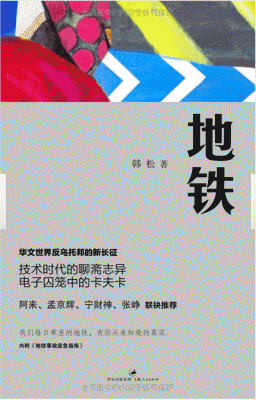
Last Subway, by Han Song
Han Song is not Liu Cixin. He writes poems, some 200 of them, but he has never published them. He “writes for himself.”
And he would choose to speak to aliens.
“I want to ask them what this universe is after all,” Han Song says in earnest, after pausing to seriously contemplate the question, like a pupil ready to ask his teacher a math question.
“Would they know?” I ask in a whisper.
His thoughtful expression takes me to the scene of his imaginary encounter.
“No, they won’t know either,” he resolves quickly.
“Then why ask?”
“They might have their own understanding of the universe. It’s probably different from ours, I think.”
Han doesn’t expect or create any solutions at all. The worlds in his sci-fi stories are always in states of confusion. In “Flee From Sorrow Mountain,” the hero Han Yu and his wife travel to You Mountain. When they wake up the next day, they find everyone has disappeared. Time has stopped. It is 3 AM. The more they investigate their situation, the more desperate they become.
Unlike Wang Jinkang, who always uses a scientist character to explain the scientific theories behind his works, the people in Han Song’s novels have no idea what is happening. They are plunged into tragedy and struggle to cope in dire circumstances. They find themselves locked in puzzles to the very end. His story “Soft Art” ends with one sentence, “He thinks for a while and says ‘Oh’ to himself.”
“Human are trapped in the universe,” Han Song frowns and looks down, “the universe is too immense to know. People are unconsciously terrified of this ignorance.” His voice is hoarse. He seems burdened by these unanswered questions. They slow down his speaking, thinking and even actions.
In his story “Liang Mountain in Spring,” the historic “Water Margin” heroes struggle to leave the mountain but fail. They just find more Liang Mountains outside. Han Song says that’s a metaphor for the structure of the universe.
He questioned the universe early in life. He wrote his first sci-fi story at the age of 17. Nine years later, “The Gravestones in the Universe” won him a prize at the “The First Global Chinese Sci-fi Art Awards” in 1991. The story is about human beings building grand, delicate gravestones on the stars. In this novel, grandness is nothing compared to the magic of the universe. The hero realizes suddenly how to live peacefully with the universe; how to forget himself and listen to the universe.
In most of his sci-fi novels, especially the later works, humans seldom talk with aliens, but rather they watch and think in horror. The realism in his works is dressed in a sci-fi coat. The stories are usually set in the daily bustle of Chinese cities. Reality is always somehow distorted. This is the premise of his new book, “Subway” a collection of short stories. In one, a clerk, Old Wang, witnesses passengers being transported to another world by green creatures. Another tale has commuters aging 50 years by the second, some feasting on one another’s flesh, riding a subway train that won’t stop.
“My novels are not good sci-fi,” Han says with regret. “Sci-fi needs scientific professionals.” Han majored in English and Journalism. His strong attention to reality gives his novels a philosophical depth. He tries to point out the dangers of society; the terror of the claustrophobic subway, the rapid development of the economy, the centralized social system. These ideas pepper his novels with a satirical disdain for the Chinese reality.
Han worries that it is hard for non-Chinese to understand this kind of satire—they might see it just for the satire and not for the hope. “It’s not easy for foreigners to understand China and the Chinese. They need to develop a dialectical understanding, see all sides, just as we appreciate the ‘yin’ and the ‘yang.’”
“I hope to prevent tragedy in China, and in the world, with my writing,” Han says sincerely. “I don’t think humans have rid themselves of their innate evil. It’s just suppressed by technology. If there is a spark of chaos, the worst will happen. That goes for all people, whether Chinese or Western.”
He still doesn’t think he does enough to expose danger. “We should keep thinking back to why terrible things have happened in history and not allow those things to happen again.” And that’s why a good sci-fi novel should be a mirror of reality, as Han once said.
In this way, Han Song hides his deepest worries and best blessings for the human race into the darkest of his imageries. When we took the elevator up to his office together, he hid himself in a corner, facing the wall alone, his back to the other passengers. It’s a habit of his. No one sees that he is smiling to this world softly inside.
Learn more about China’s future in our third magazine issue here!





